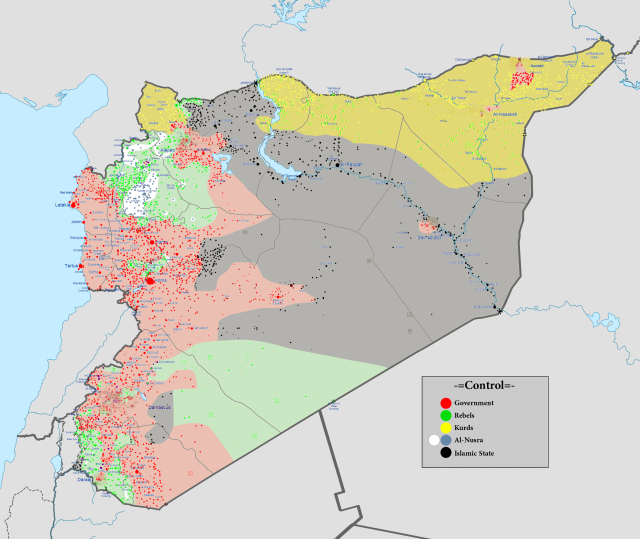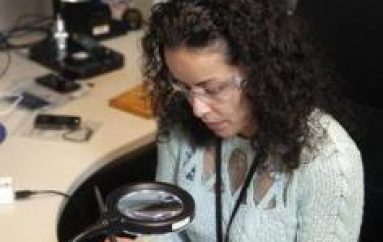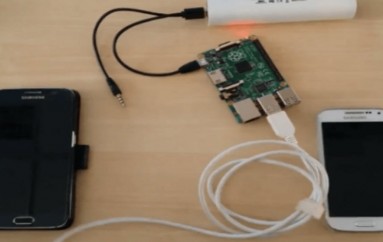
Hacking Team hacker steals €10K in Bitcoin, sends it to Kurdish anticapitalists in Rojava
The hacker who claimed responsibility for both the Gamma Group and Hacking Team breaches has struck again, this time sending €10,000 (about £8,000) of allegedly stolen Bitcoin to Rojava, an autonomous region in northern Syria that they described as “one of the most inspiring revolutionary projects in the world today.”
The hacker, who goes by the pseudonyms “Phineas Phisher,” “Hack Back!” and “@GammaGroupPR,” declined to name the victims of the heist, saying he’d “rather not yet, since there’s hopefully a few orders of magnitude more on the way.”
If true, Rojava could soon be the beneficiary of a cool million in Bitcoin.
Rojava is one of the most inspiring revolutionary projects in the world today. I just donated 10000€ in bitcoin https://t.co/2ubZctplSy
— Hack Back! (@GammaGroupPR) May 5, 2016
Considered by neighbouring Turkey as a haven for the PKK, or Kurdistan Workers’ Party, a group designated by the US State Department as a “terrorist organisation” which seeks to create an independent Kurdish homeland, Rojava is not, on closer inspection, that easy to pigeonhole.
An in-depth investigation by The New York Times last year found stark contrasts with ISIL/Daesh, with whom Rojava are at war, including a constitution that mandates gender equality and freedom of religion.

Cut off from foreign trade by the conflict with ISIL/ISIS/Daesh and a hostile Turkey, the region is struggling to feed itself, and seeks donations to purchase farm equipment, according to theircrowdfunding page.
“We are currently extremely busy and it is sometimes hard to get online, this being a warzone and all,” Deniz Tarî, from Rojava Plan, told Ars by e-mail. “You can see the payments made to our campaign on the campaign page. You can also check our Bitcoin address, which is public.”
The page lists a €10,000 donation by “Hack Back!”. The Rojava Plan’s Bitcoin address received a 25 BTC transaction timestamped 2016-05-05. At current market prices that’s around €10,000 or £8,000.
“And for what we will do with the money,” Tarî added, “you can also check our campaign page where we have a rough description of where the money is going.”
The crowdfunding campaign has received just over €26,000 at the time of writing, and includes a plan to purchase, among other things, two trucks, a small bulldozer, and a hangar. Their stated goal is to recycle human and animal waste as ecological fertiliser for the region’s wheat farms.
“They’re in an incredibly difficult situation, with ISIS on one side and US ally Turkey embargoing and attacking them on the other,” the hacker told Ars. “Yet, in a part of the world the West likes to look down on as a backwards shithole, they’re building a society that takes ‘Western’ values like democracy and feminism to lengths that put the West to shame. All while fighting ISIS and winning, unlike the US trained and supplied Iraqi army.”
The hacker donated the money not only to support Rojava, but also to draw media coverage to the region, which he said too often defaulted to a “gimmicky article about women fighting ISIS, headlined by a picture of a hot chick with a gun.”
Instead, he argued that Rojava should be compared to “other libertarian revolutions or attempts such as anarchism during the Spanish Civil War [1], the Ukrainian Free Territory [2], the Paris Commune[3], autonomous Shinmin [4], a small glimmer of hope from inside the empire [5] [the Seattle General Strike of 1919], APPO [6], CIPO-RFM [7], or the Zapatistas [8].”
Rojava stretches along the Syrian-Turkish border for 400km or so, and is bounded to the south and west by the Euphrates River and to the east by Iraq. The region also includes the northwestern tip of Syria. The two parts are separated by around 100km of ISIL-controlled territory.
The US is not a fan. In March of this year, US State Department spokesman John Kirby told Reutersthat “We don’t support self-ruled, semi-autonomous zones inside Syria. We just don’t.”
To others, though, Rojava is on the cutting edge of progress. “What you are doing is a unique experiment that deserves to succeed,” Raymond Joliffe (Lord Hylton), a member of the UK House of Lords, said during a 2015 visit, according to The New York Times.
In a moment of snark, Phineas Phisher told Ars:
If you do talk about [Rojava’s] politics, misrepresent them as a Kurdish nationalist movement fighting to establish a Kurdish state. Because of course a neoliberal “democratic” state is what any freedom loving people would want. Ignore the fact that while mostly Kurds, there’s a variety of ethnicities, religions, and languages in Rojava. Absolutely do not mention words like “democratic confederalism,” “direct democracy,” “anticapitalist,” “feminism,” “social ecology,” or “libertarian socialism”. Remember, according to Fukuyama we’ve reached the “end of history.” And according to Thatcher, “there is no alternative.” That depends on you not talking about the alternative.
David Graeber, a professor at the London School of Economics, who visited Rojava in December 2014, agreed with the hacker’s analysis that the region bears strong resemblance to past anarchist movements. The difference, he told Ars, was that in this case “they’re a radical anti-authoritarian movement that’s also militarily super-effective.”
However, Graeber dismissed the idea that the funds would be used for something other than purchasing farm equipment. “They have dire economic needs,” he said, but “militarily they are already getting what they need from the US and Russia, even though neither will admit it.”
Graeber also noted that Rojava “captures most of their weapons from ISIS because they’re much better fighters.”
Tarî emphasised that Rojava Plan is not part of the region’s military.
“We are part of the economic committee and do civil projects not military ones,” Tarî told Ars. “If we get the one million euros [which Phineas Phisher has suggested he will donate] we would use it to fund our other projects that we want to do such as the Kurdish Ubuntu distro and earthbags for construction.”
An October 2015 Amnesty International report raises questions, however. The NGO’s fact-finding mission concluded that the Rojava military’s past “razing of villages amounts to war crimes.”
“By deliberately demolishing civilian homes, in some cases razing and burning entire villages, displacing their inhabitants with no justifiable military grounds, the Autonomous Administration is abusing its authority and brazenly flouting international humanitarian law, in attacks that amount to war crimes,” said Lama Fakih, senior crisis advisor at Amnesty International.
“Amnesty International stands by the findings of this report,” Amnesty International’s Sara Hashash told Ars by e-mail. “The wave of forced displacement and home demolitions by the PYD [Democratic Union Party] led Autonomous Administration may amount to war crimes.”
Asked about the possibility that the donated Bitcoin could support further war crimes, the hacker said: “Yes I’ve seen the Amnesty report… it seems the Amnesty report is misleading. In researching the report they stayed with and interviewed groups actively fighting the YPG [Rojava’s military]. So, ‘people fled heavy fighting between YPG and other factions which destroyed a village’ becomes ‘the YPG forcibly displaced people and razed their village.’ And “the YPG detained someone for actively supporting armed groups fighting the YPG” becomes ‘the YPG is detaining people for being Arabs.'”
He pointed to a Rojava statement criticising the Amnesty report, also noted that Rojava “is not solely a Kurdish revolution, there’s plenty of Arabs within Rojava as well, who also released a statementcondemning the Amnesty report.”
Rojava’s ideas have clearly captured the hacker’s enthusiasm—and Graeber’s, as well.
“Just to get a sense of how radical this is,” Graeber said, “when I was in Rojava, people told me ‘we’re anti-capitalist. But we’ve learned from the 20th century that you can’t destroy capitalism unless you get rid of the state. And that you can’t get rid of the state unless you get rid of patriarchy.’ So that’s why you see all those women soldiers. How to get rid of patriarchy? Well, making sure all women have access to automatic weapons is an obvious start.”
Graeber added, “One of the first places they took me was a police academy, where they said, their ultimate aim was to give everyone in the country six weeks of police training, then abolish the police.”
The US State Department did not respond to our request for comment.
Source | ARSTechnica





